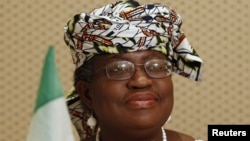HARARE -- "We have the power." That was the war cry of about 300 women meeting in the Zimbabwean capital after President Robert Mugabe officially opened the GlobalPower Women Network Africa conference.
Composed of African women who aim to stop HIV infections and establish zero-tolerance for violence against women, the network includes ministers, lawmakers, entrepreneurs and several civil society leaders.
The group wants African leaders to make the continent a better place for female children. And although the conference is about women, men were invited to speak.
"Reproductive health status of Africa remains poor," said African Union Deputy Commissioner Erastus Mwencha in his conference address. "Our continent, where the path of child and motherhood are traditionally celebrated, records the highest ratio in maternal- and infant-mortality rates worldwide. No woman should die while giving life."
African leaders, he said, must invest more in health care if Millennium Development Goals are to become a reality.
According to United Nations figures, more than half of all maternal deaths are estimated to occur in Africa, with an average maternal-mortality ratio of 620 per 100,000 live births -- a significant proportion by AIDS-related causes.
Nigerian Finance Minister Ngozi Okonjo-Iweala, a former managing director of the World Bank and the conference's guest speaker, said technology already exists that can vastly improve African mortality rates.
"Investing in women is smart economics, and investing in girls is smarter economics," she said. "Investing in the education and health is critically important -- no one should die of HIV in this modern day when we have technology to stop this from happening."
After the meeting, attendees will present what they call "Harare's Call to Action” to African Union leaders when they attend June meetings in Malawi. The women want AU leaders to commit to work on key issues affecting young African girls in regards to HIV, sexual and reproductive health rights, and to accelerate action on the Millennium Development Goals, such as equal gender representation in political positions.
The meeting was jointly organized by the African Union and the U.N. AIDS program.
Composed of African women who aim to stop HIV infections and establish zero-tolerance for violence against women, the network includes ministers, lawmakers, entrepreneurs and several civil society leaders.
The group wants African leaders to make the continent a better place for female children. And although the conference is about women, men were invited to speak.
"Reproductive health status of Africa remains poor," said African Union Deputy Commissioner Erastus Mwencha in his conference address. "Our continent, where the path of child and motherhood are traditionally celebrated, records the highest ratio in maternal- and infant-mortality rates worldwide. No woman should die while giving life."
African leaders, he said, must invest more in health care if Millennium Development Goals are to become a reality.
According to United Nations figures, more than half of all maternal deaths are estimated to occur in Africa, with an average maternal-mortality ratio of 620 per 100,000 live births -- a significant proportion by AIDS-related causes.
Nigerian Finance Minister Ngozi Okonjo-Iweala, a former managing director of the World Bank and the conference's guest speaker, said technology already exists that can vastly improve African mortality rates.
"Investing in women is smart economics, and investing in girls is smarter economics," she said. "Investing in the education and health is critically important -- no one should die of HIV in this modern day when we have technology to stop this from happening."
After the meeting, attendees will present what they call "Harare's Call to Action” to African Union leaders when they attend June meetings in Malawi. The women want AU leaders to commit to work on key issues affecting young African girls in regards to HIV, sexual and reproductive health rights, and to accelerate action on the Millennium Development Goals, such as equal gender representation in political positions.
The meeting was jointly organized by the African Union and the U.N. AIDS program.




